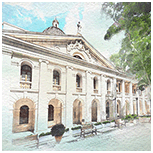Review of 2023

At the Ceremonial Opening of the Legal Year on 16 January 2023, the Hon Chief Justice Andrew CHEUNG affirmed the importance of this annual event as it focused the community’s attention on the rule of law, the administration of justice, and the central role of the Judiciary in this regard.
Although the public may be cognizant of the role of the Judiciary under the “One Country, Two Systems” arrangement, the Hon Chief Justice Andrew CHEUNG underscored the importance of an accurate understanding of this role and further expounded upon the three main functions of the Judiciary.
The primary role of the Judiciary is to uphold the rule of law and administer justice in strict accordance with the law. The second role of the Judiciary is to protect the fundamental rights set out in Chapter III of the Basic Law, as well as the Hong Kong Bill of Rights, which is constitutionally entrenched under Article 39(1) of the Basic Law. The third role of the Judiciary is to develop the case law to adapt to new circumstances where appropriate and justified under the common law system.
The Hon Chief Justice Andrew CHEUNG stressed that the role of the courts under the common law is to faithfully apply the law. The courts do not make policies or political decisions. While the courts of the Hong Kong Special Administrative Region (“HKSAR”) are vested with independent judicial power, including that of final adjudication, in accordance with authorisation from the National People’s Congress through the provisions of the Basic Law, the jurisdiction of the courts is set out and delimited by the Basic Law and other relevant laws of Hong Kong. The courts must respect and uphold the constitutional order of the HKSAR under the Constitution of our country.
The Hon Chief Justice Andrew CHEUNG further iterated that the Judiciary must remain a modern one that moves with the times. He summarised the enhancement measures that had been taken to maintain public confidence in the judicial system. He also outlined the initiatives that would be taken to enhance the transparency of judicial proceedings and promote a wider adoption of the e-litigation system.
►Appointment of Judges and Judicial Officers
A number of judicial appointments took effect in 2023.
The Hon Patrick KEANE was appointed as a Non-Permanent Judge from another common law jurisdiction of the Court of Final Appeal on 6 April 2023.
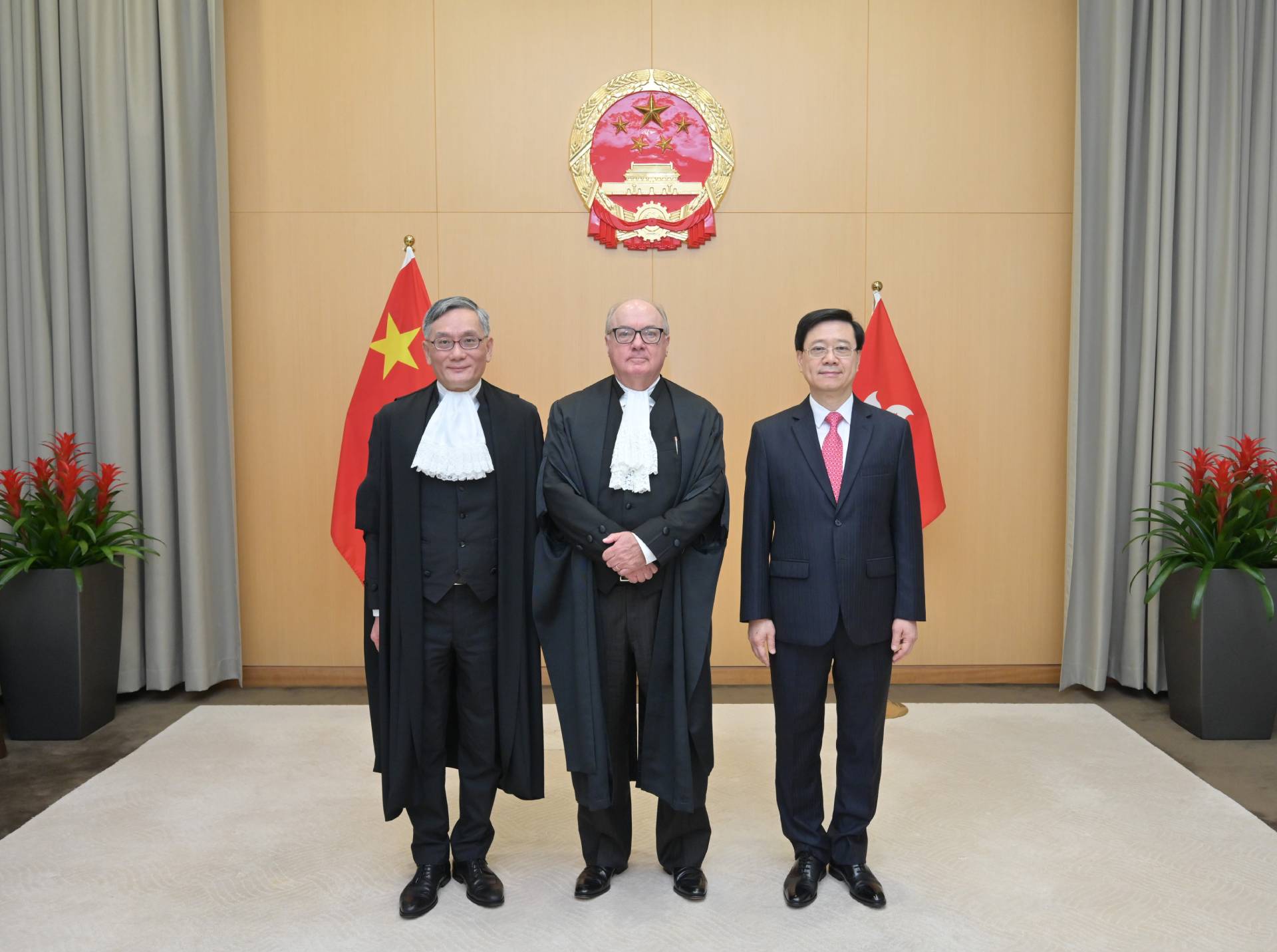 Appointment of the Hon Patrick KEANE (centre) as a Non-Permanent Judge from another common law jurisdiction of the Court of Final Appeal
Appointment of the Hon Patrick KEANE (centre) as a Non-Permanent Judge from another common law jurisdiction of the Court of Final AppealHis Honour Judge WONG King Wah was appointed as the Registrar of the Court of Final Appeal and a Senior Deputy Registrar, High Court on 1 June 2023.
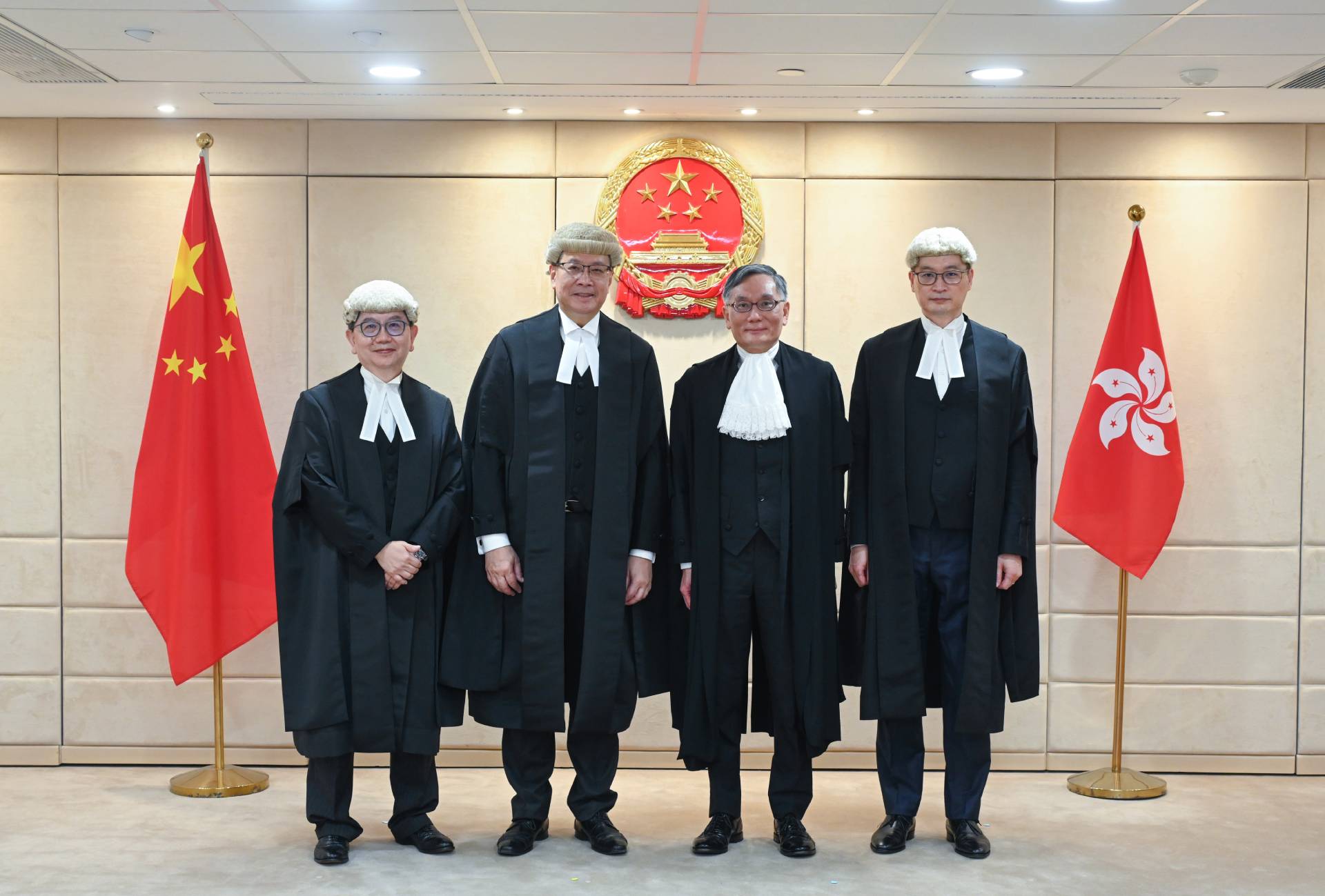 Appointment of His Honour Judge WONG King Wah (second left) as the Registrar of the Court of Final Appeal and a Senior Deputy Registrar, High Court
Appointment of His Honour Judge WONG King Wah (second left) as the Registrar of the Court of Final Appeal and a Senior Deputy Registrar, High Court Mr Kestrel LAM was appointed as a Permanent Magistrate on 11 January 2023.
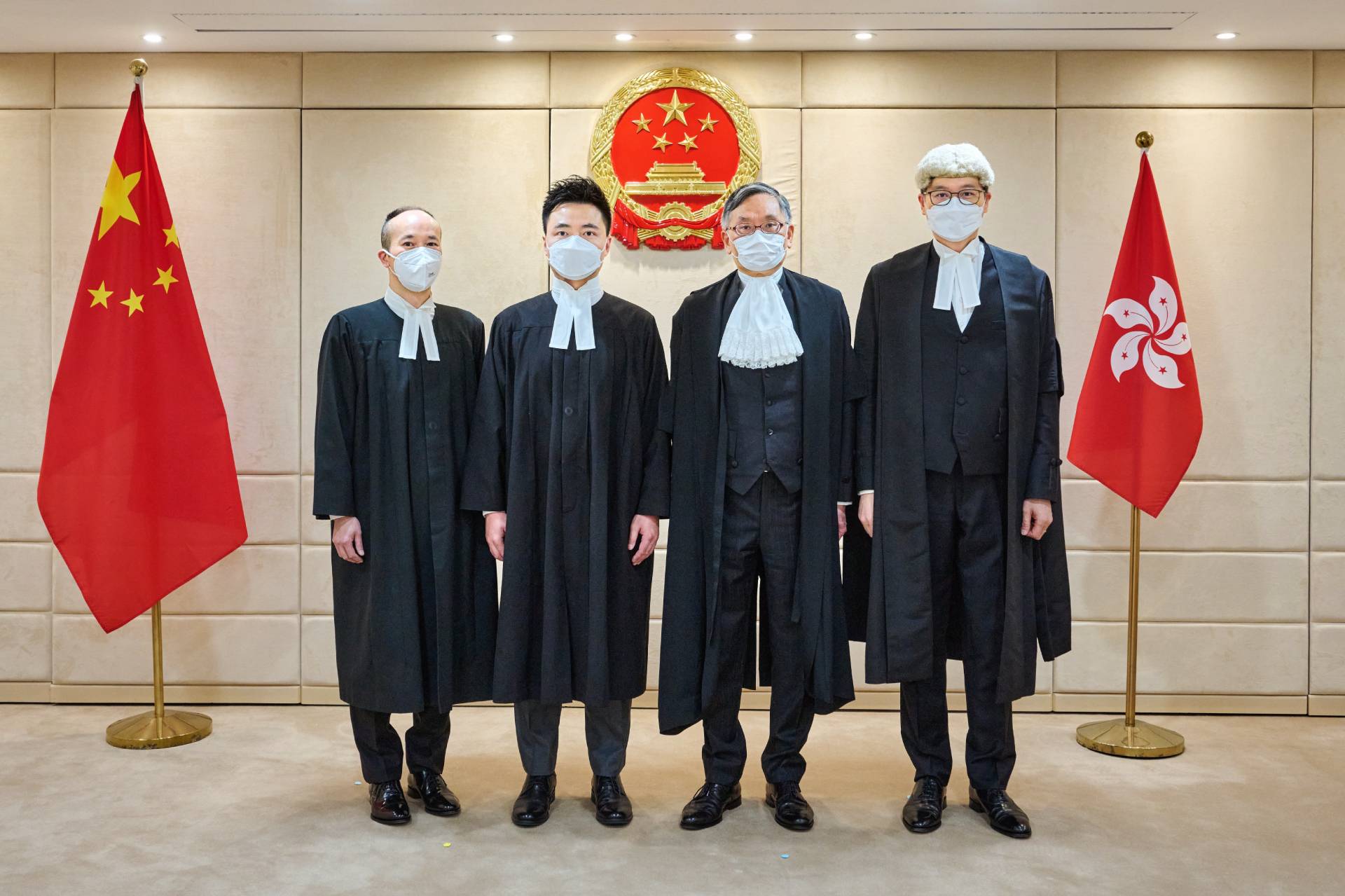 Appointment of Mr Kestrel LAM, (second left) as a Permanent Magistrate
Appointment of Mr Kestrel LAM, (second left) as a Permanent MagistrateMiss Vienne LUK was appointed as a Permanent Magistrate on 27 February 2023.
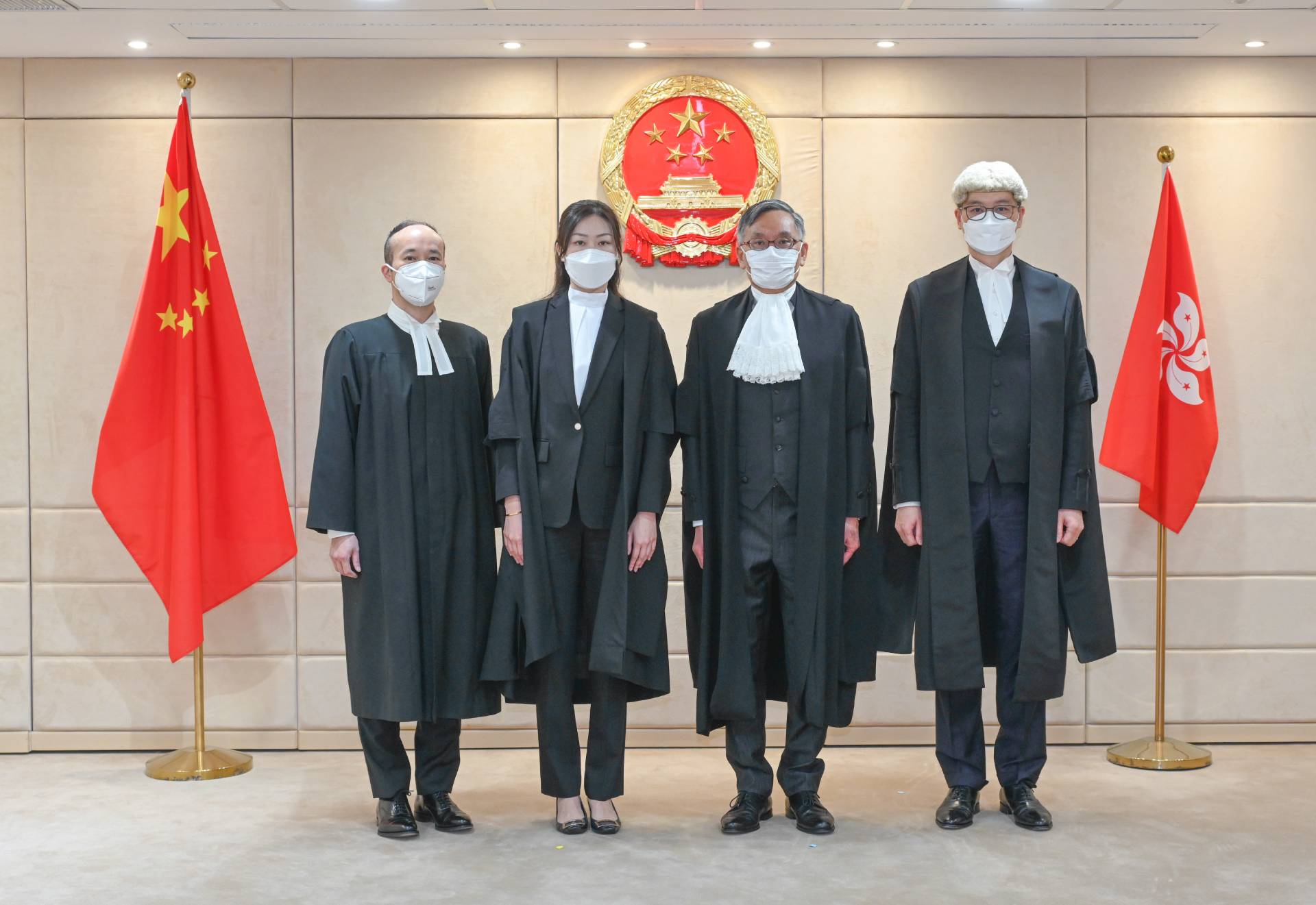 Appointment of Miss Vienne LUK (second left) as a Permanent Magistrate
Appointment of Miss Vienne LUK (second left) as a Permanent MagistrateMs Minnie WONG was appointed as a Permanent Magistrate on 28 September 2023.
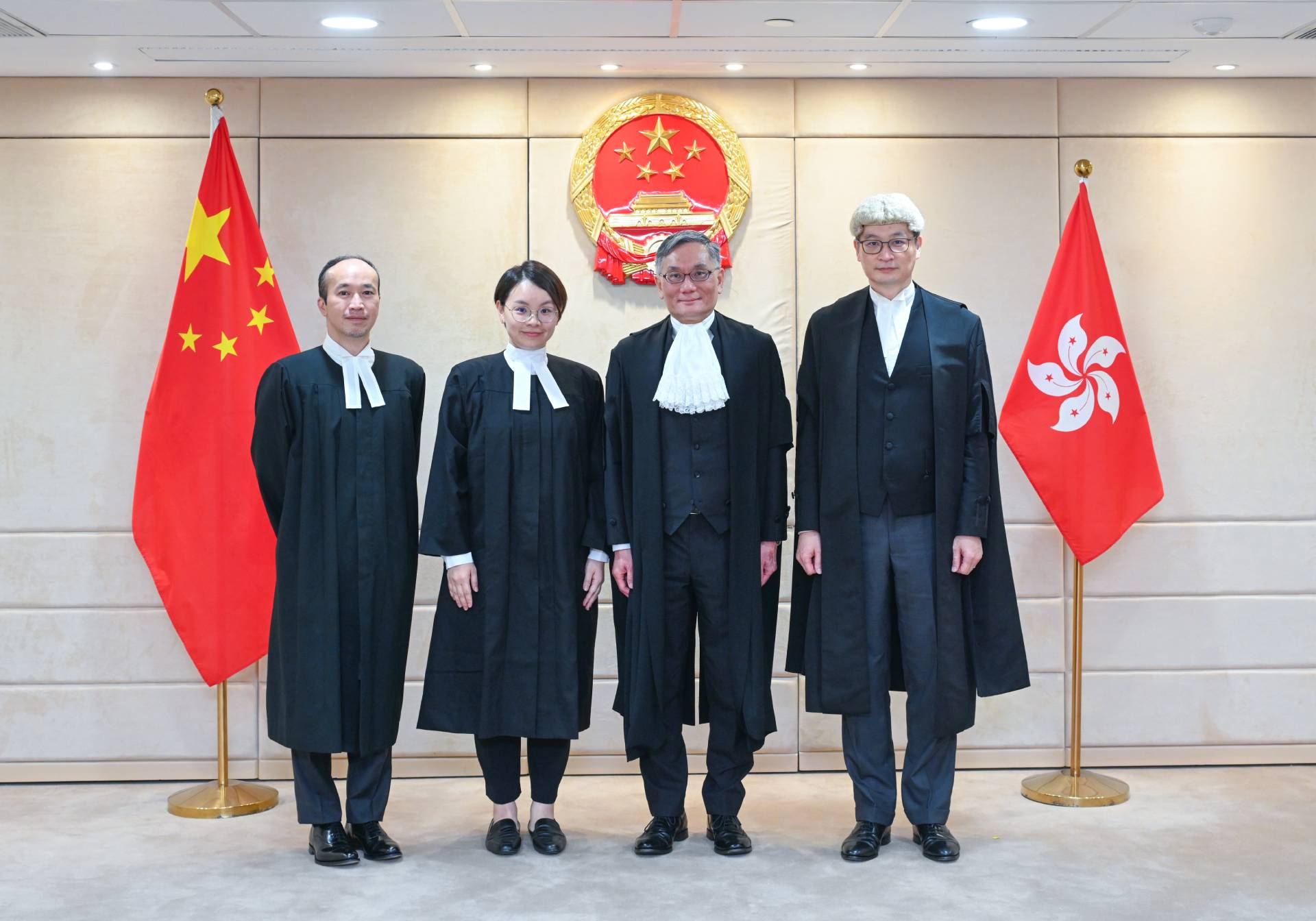 Appointment of Ms Minnie WONG (second left) as a Permanent Magistrate
Appointment of Ms Minnie WONG (second left) as a Permanent Magistrate ►Judicial training
In 2023, our judges and judicial officers continued to participate in various judicial training activities organised by the Hong Kong Judicial Institute. Starting from 2021, the Hong Kong Judicial Institute organised a series of seminars on Chinese law to strengthen the understanding of the legal and judicial system of the Mainland. A seminar on the Civil Code of the People’s Republic of China was conducted in March 2023.
In June 2023, the Hong Kong Judicial Institute organised a talk entitled “Sir Edward Coke and the Common Law” delivered by the Hon Mr Justice Patrick KEANE, Non-Permanent Judge of the Court of Final Appeal.
►Exchanges with the Mainland and other jurisdictions
With the easing of the COVID-19 pandemic, the Judiciary received many judges, visitors from the legal sector and senior government officials from the Mainland and overseas jurisdictions in 2023. Furthermore, our judges and judicial officers continued to participate in exchanges with their counterparts in the Mainland and other jurisdictions by attending conferences and seminars, held both locally and outside Hong Kong. Some of the significant exchanges are set out below.
In March, the Hon Chief Justice Andrew CHEUNG; the Hon Mr Justice Jeremy POON, Chief Judge of the High Court; the Hon Mr Justice Godfrey LAM, Justice of Appeal of the Court of Appeal of the High Court; the Hon Mr Justice Anthony CHAN and the Hon Mr Justice David LOK, Judges of the Court of First Instance of the High Court, visited cities in the Guangdong-Hong Kong-Macao Greater Bay Area, namely Guangzhou, Shenzhen and Zhuhai. The delegation met with Mr YANG Wanming, Vice-President of the Supreme People’s Court (“the SPC”), visited court facilities, attended discussion forums and had professional exchanges with Mainland judges and judicial staff on judicial issues and court operational matters.
In the same month, the Hon Chief Justice Andrew CHEUNG; the Hon Mr Justice Joseph FOK and the Hon Mr Justice Johnson LAM, Permanent Judges of the Court of Final Appeal, attended the Asia Pacific Judicial Colloquium in Wellington, New Zealand. The Hon Mr Justice Roberto RIBEIRO, Permanent Judge of the Court of Final Appeal also participated in the Colloquium via video conferencing. During the Colloquium, the judges engaged in professional exchanges on various topics with their counterparts from Australia, Canada, New Zealand and Singapore.
In April, Mr Fikrat MAMMADOV, Minister of Justice, Republic of Azerbaijan visited the Judiciary.
In May, the Hon Chief Justice Andrew CHEUNG; the Hon Mr Justice Jeremy POON, Chief Judge of the High Court; and the Hon Madam Justice Carlye CHU, Vice-President of the Court of Appeal of the High Court visited Beijing. The delegation met with Chief Justice ZHANG Jun, President of the SPC, and visited other courts and government authorities in Beijing.
In the same month, His Honour Judge Justin KO, Chief District Judge; His Honour Judge CK CHAN, Principal Family Court Judge; and His Honour Judge Simon LO, His Honour Judge George OWN and Her Honour Judge Thelma KWAN, District Judges, visited courts and government authorities in Guangzhou and Shenzhen, and attended a seminar on matrimonial and family law matters.
Also in the same month, a three-member delegation led by the Hon Dato Seri Paduka Steven CHONG, Chief Justice of the Supreme Court of Brunei Darussalam, visited the Judiciary.
In June, a seven-member delegation led by Mr LI Zhanguo, President of the High People's Court of Zhejiang Province, visited the Judiciary.
In September, the Hon Chief Justice Andrew CHEUNG delivered opening remarks at the opening ceremony of the HCCH Asia Pacific Week 2023 organised by the Hague Conference on Private International Law. The Hon Madam Justice B. CHU, Judge of the Court of First Instance of the High Court, and Mr Simon KWANG, Registrar of the High Court, also delivered speeches at the conference.
Moreover, an eight-member delegation led by Professor Dr Arief HIDAYAT, Justice of Constitutional Court of the Republic of Indonesia, and another eight-member delegation led by Mr IP Son Sang, Prosecutor-General of the Macao Special Administrative Region, visited the Judiciary.
In the same month, led by the Hon Chief Justice Andrew CHEUNG, the Hon Mr Justice Jeremy POON, Chief Judge of the High Court, the Hon Madam Justice Carlye CHU, Vice-President of the Court of Appeal of the High Court, the Hon Mr Justice Godfrey LAM, Justice of Appeal of the Court of Appeal of the High Court, and the Hon Madam Justice Queeny AU-YEUNG, Judge of the Court of First Instance of the High Court, delivered presentations at the Seventh Seminar of Senior Judges of Cross-Strait and Hong Kong and Macao held in Macao.
Importantly, the SPC and the Judiciary launched an attachment programme in 2023, whereby judges and judicial officers of the Mainland and Hong Kong would visit each other's courts in order to gain a deeper understanding of each other’s judicial systems and court operations, focusing primarily on civil and commercial areas. Three Mainland judges were attached to the High Court between mid-September and mid-December.
From late October to early November, the Hon Mr Justice Jeremy POON, Chief Judge of the High Court, with the Hon Mr Justice Johnson LAM, Permanent Judge of the Court of Final Appeal, led a delegation of 17 judges and judicial officers to visit Beijing for an eight-day exchange programme jointly organised by the National Judges College and the Hong Kong Judicial Institute. During the visit, the delegation engaged in exchanges with their counterparts in the Mainland and attended discussion forums and thematic talks on judicial issues and the latest developments of the country. The delegation also visited court premises and facilities relating to technology and culture, etc.
In November, the Hon Mr Justice Jeremy POON, Chief Judge of the High Court, gave a keynote speech at the Hong Kong Legal Week 2023. The Hon Mr Justice Johnson LAM, Permanent Judge of the Court of Final Appeal, and the Hon Mr Justice Jonathan HARRIS, Judge of the Court of First Instance of the High Court, spoke at the Judicial Roundtable and the Judicial Conference of the 5th UNCITRAL Asia Pacific Judicial Summit 2023 respectively.
In the same month, an eight-member delegation led by Mr ZHANG Haibo, President of the High People’s Court of Guangdong Province, visited the Judiciary.
►Meeting challenges on caseload
In 2023, the Judiciary continued to face the dual challenges of a heavy caseload and limited judicial manpower at various levels of court. Court operations were also burdened with challenges arising from an increasing number of complex cases, including those related to the 2019 anti-extradition amendment bill incidents (“anti-EAB cases”) and national security (“NS cases”), as well as the persistent influx of leave applications for judicial review in respect of non-refoulement claims and related appeals at the High Court and the Court of Final Appeal.
The Judiciary has taken pro-active and multi-pronged measures to make the best possible use of the available manpower and court facilities to process as much court business as efficiently as possible, with priority given to anti-EAB and NS cases as appropriate. Such measures include -
| (a) | engaging additional judicial manpower – the Judiciary conducts open recruitment exercises for judges and judicial officers at different levels of court from time to time with a view to maintaining sufficient judicial manpower to meet operational needs; |
| (b) | adopting a more pro-active case management approach for anti-EAB and NS cases, including imposing tight procedural timetables; |
| (c) | making use of longer court sitting hours and Saturday sittings where appropriate; |
| (d) | adopting alternative means of disposal for civil proceedings (including judicial reviews) such as remote hearings and paper disposal where appropriate; and |
| (e) | enhancing courtroom capacity and providing additional court facilities. |
With these practical initiatives, the Judiciary managed to process a substantial overall caseload, including an increasing number of complex cases which require longer processing times. With priority allocated to complex cases in respect of the anti-EAB and NS, the Judiciary had disposed of some 2 140 (or around 93%) of over 2 310 anti-EAB cases and over 170 cases (or around 85%) of about 200 NS cases brought at various levels of court. The Judiciary also managed to dispose of an overall caseload comparable to that of 2019, before the COVID-19 pandemic and achieved the target court waiting times for majority of the civil cases in 2023. However, due to the deployment of judicial resources to handle with prioritiy anti-EAB and NS cases (many of which are complex cases involving large numbers of defendants and legal representatives, large volumes of video evidence, and longer trials), the average court waiting times for criminal cases were inevitably affected.
►Enhancement of court facilities and security
Additional court facilities were furnished in 2023 for meeting increasing operational needs. One mega courtroom and three standard courtrooms were commissioned in the Wanchai Tower in 2023. Six more new courtrooms in the High Court Building and three more courtrooms in the Revenue Tower are expected to be completed in 2024.
The construction works for a new District Court Building commenced in September 2023. These new facilities are intended to provide a dedicated law courts building for the reprovisioning and co-location of the District Court, the Family Court and the Lands Tribunal. The works are expected to be completed in 2026, for the new building to begin operations in 2027.
In respect of court security, the works for extending security screening to all floors of the High Court Building are in development, in addition to the security screening already in operation at the Court of Final Appeal Building and the West Kowloon Law Courts Building, as well as the District Court and the Family Court. As part of on-going efforts to ensure the safety of judges, judicial officers, Judiciary staff and court users, these measures aim to prevent prohibited items from being brought into court premises.
With a significant number of cases attracting public and media attention, the Judiciary has been taking appropriate crowd management and security measures, including adopting queuing and ticketing arrangements to ensure a fair allocation of seats and an orderly admission of court users, using CCTV recording to deter unruly behaviour, as well as deploying security manpower proportionately to maintain order and security in court premises.
►Greater use of technology
The Judiciary has spared no effort in making greater and more effective use of technology with a view to enhancing the efficiency of court operations. In 2023, implementation of a series of key technology initiatives continued to proceed apace, including e-filing under the Information Technology Strategy Plan (“ITSP”), increased use of e-bundles at court hearings where appropriate, e-appointments for specific court services as well as a digital evidence and exhibits handling system.
Over the past few years, under the ITSP, the Judiciary has been developing and implementing the integrated Court Case Management System (“iCMS”) in phases across all levels of court for handling court-related documents and payments via electronic mode. The iCMS had been implemented in the District Court and the Magistrates’ Courts since May and December 2022 respectively. This platform can now be used for Personal Injuries Actions, Tax Claims, Civil Actions and Employees’ Compensation Cases of the District Court, and summons cases of the Magistrates’ Courts. Incremental rollout of the iCMS for public use in other courts is targeted to start in 2024. These include the Court of Final Appeal, the High Court, the non-summons cases of the Magistrates’ Courts and the Small Claims Tribunal.
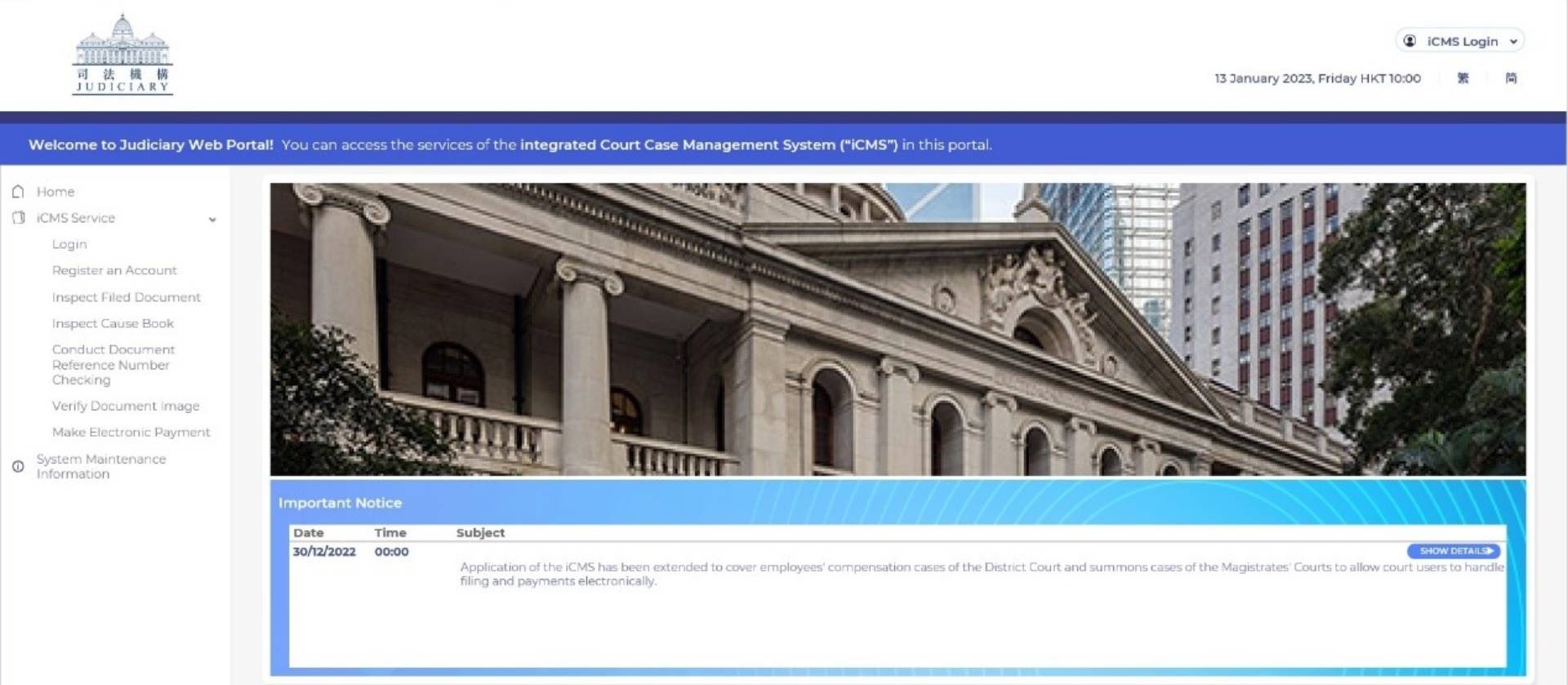 Integrated Court Case Management System in Judiciary Web Portal
Integrated Court Case Management System in Judiciary Web PortalTo facilitate a quicker and wider migration to the electronic mode of litigation, the Judiciary has been planning to mandate the use of iCMS for all legally represented litigants within a specified target timeframe. In this regard, the Judiciary will consult the legal profession and other stakeholders on the implementation arrangements in January 2024, while putting in place safeguards to ensure unrepresented litigants’ right of access to court.
In conjunction with the implementation of the ITSP, the Judiciary has been using e-bundle hearings for suitable District Court civil cases since December 2020. A new Practice Direction on the use of e-bundles for commercial cases of the Court of First Instance of the High Court has been in force since May 2022. Another new Practice Direction on “Electronic Bundles and Skeleton Arguments for all applications on Company, Winding-up and Bankruptcy Matters” was implemented in July 2023. The feedback from users in such proceedings has been positive. Taking into account this operational experience, the Judiciary will encourage more e-bundle hearings in the near future.
The Judiciary has also been promoting the wider use of remote hearings for civil proceedings. Thus far, over 1 770 remote hearings (including video-conferencing or telephone hearings) have been conducted and the experience of court users has been positive. In order to enable remote hearings for criminal proceedings, the Judiciary has been developing a draft Courts (Remote Hearing) Bill to provide the courts with the flexibility to order remote hearings where appropriate, having regard to all relevant circumstances, as well as the dual requirements of open justice and fairness. The Judiciary launched a three-month public consultation on the draft Bill in June 2022 and consulted the Panel on Administration of Justice and Legal Services of the Legislative Council in May 2023. The Bill is being finalised in light of feedback that has been received and will be introduced into the Legislative Council some time in 2024.
In a separate initiative, the Judiciary is actively exploring the live broadcast of selected judicial proceedings to the public. Live broadcasting of court proceedings enhances the transparency of court procedures and public confidence in the judicial process. The Judiciary is mindful that not all proceedings are inherently suitable for live broadcasting. The Judiciary will launch a trial run of live broadcasting of two court proceedings from the Court of Final Appeal to the public in January 2024. The primary objective of the trial run is to test the technical feasibility of the arrangements, including the information technology and audio-visual setup, as well as the logistical and operational details before, during and after the hearings. Taking into account the technical feasibility assessment, court users’ feedback, and operational experience from the trial run, the Judiciary will conduct a review and consider the way forward for live broadcasting of court proceedings outside court premises in the longer term.
Furthermore, the Judiciary is testing various voice recognition software, particularly in respect of the accuracy of voice recognition, with a longer term view to making use of this technology to record court proceedings and prepare transcripts where appropriate.
►Streamlining procedures for family-related proceedings
The Family Procedure Ordinance (Cap. 646) was passed by the Legislative Council in June 2023. The Ordinance provides the statutory basis for a consolidated set of self-contained and streamlined procedural rules for the Family Court, with a view to making the family justice system more efficient, cost-effective and user-friendly. The Family Procedure Rules Committee has been established under the Ordinance as the single authority for making such procedural rules. A new Masters system was also established in the Family Court in October 2023, by which Family Masters are empowered to handle certain procedural work in family-related proceedings in order to alleviate the heavy workload of the Family Judges.
►Mutual legal assistance arrangements with the Mainland
Pursuant to Article 95 of the Basic Law, the HKSAR has to date signed nine arrangements with the Mainland on mutual legal assistance in civil, commercial and arbitral matters. Following the passage of the enabling legislation by the Legislative Council in October 2022, the Chief Judge of the High Court promulgated the Mainland Judgments in Civil and Commercial Matters (Reciprocal Enforcement) Rules in November 2023 to provide for the relevant practices and procedures ahead of the “Arrangement on Reciprocal Recognition and Enforcement of Judgments in Civil and Commercial Matters by the Courts of the Mainland and of the Hong Kong Special Administrative Region” coming into effect on 29 January 2024. The Judiciary has also been discussing with the Government and the Mainland Courts on the enhancement of the arrangement for mutual service of judicial documents in civil and commercial proceedings between the Mainland and Hong Kong Courts.

